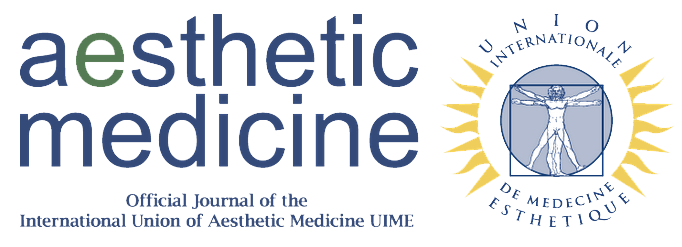Facial hypertrichosis in the course of isotretinoin treatment: four-year retrospective observation
Keywords:
isotretinoin , facial hypertrichosis, hirsutismAbstract
Background: isotretinoin is a synthetic retinoid used in the treatment of acne. There are limited and inconsistent data about the effects of isotretinoin on hormones and hair growth. Aim: to investigate a probable connection, a single center four-year retrospective data of female acne patients who were treated with oral isotretinoin, and developed facial hypertrichosis was reported. Methods: in the years 2019-2023, 327 female patients between 16-33 years of age (Mean ± Standard Deviation: 23.4 ± 4.7) were treated with 0.5-0.8 mg/kg/day isotretinoin, approximately for 6 months (6.2 ± 0.8). The patients who developed facial hypertrichosis were additionally analysed for dehydroepiandrosterone sulfate, prolactin and thyroid stimulating hormone values. Results: thirty-one patients (9.5%) in all ages (22.9 ± 4.3) declared excessive hair growth on cheeks and/or chin during treatment. All declarations were between the 2nd and 4th months (2.6 ± 0.8). The mean values of the analysed hormones were in normal ranges. Twenty seven of the thirty one patients (87%) stated that the excessive hair growth terminated completely at the end of 4th month (3.1 ± 0.7) after the cessation of the treatment, and the others declared it diminished to a great extent. Conclusions: mainly due to normal mean values of the analysed hormones, it is unlikely to consider them as the cause of hypertrichosis. Prospective studies with larger sample sizes and comprehensive hormonal profiling are essential to better understand this side effect.
References
Nelson AM, Cong Z, Gilliland KL,Thiboutot DM. TRAIL contributes to the apoptotic effect of 13-cis retinoic acid in human sebaceous gland cells. Br J Dermatol. 2011; 165(3):526-533.
Melnik BC. Apoptosis may explain the pharmacological mode of action and adverse effects of isotretinoin, including teratogenicity. Acta Derm Venereol. 2017; 97(2):173-181.
Acmaz G, Cınar L, Acmaz B, et al. The effects of oral isotretinoin in women with acne and polycystic ovary syndrome. Biomed Res Int. 2019; 2019:2513067.
Akpolat D. Unexpected effects of oral isotretinoin in adolescents with acne vulgaris. Cureus. 2021; 13(8):e17115.
Aktar R, Gunes Bilgili S, Yavuz IH, et al. Evaluation of hirsutism and hormonal parameters in acne vulgaris patients treated with isotretinoin. Int J Clin Pract. 2021; 75(3):e13791.
Ramot Y, Sheffer S, Zlotogorski A. Severe facial hirsutism following isotretinoin therapy: An under reported entity. Int J Trichol. 2015; 7(3):129-130.
Saraç E, Ünal A. Facial hypertrichosis after isotretinoin therapy: Is it a side effect or coincidence? Turkderm-Turk Arch Dermatol Venereol. 2022; 56:7-11.
Downloads
Published
Issue
Section
License
Copyright (c) 2024 Erkin Pekmezci

This work is licensed under a Creative Commons Attribution-NonCommercial 4.0 International License.
This is an Open Access article distributed under the terms of the Creative Commons Attribution License (https://creativecommons.org/licenses/by-nc/4.0) which permits unrestricted use, distribution, and reproduction in any medium, provided the original work is properly cited.
Transfer of Copyright and Permission to Reproduce Parts of Published Papers.
Authors retain the copyright for their published work. No formal permission will be required to reproduce parts (tables or illustrations) of published papers, provided the source is quoted appropriately and reproduction has no commercial intent. Reproductions with commercial intent will require written permission and payment of royalties.

This work is licensed under a Creative Commons Attribution-NonCommercial 4.0 International License.





